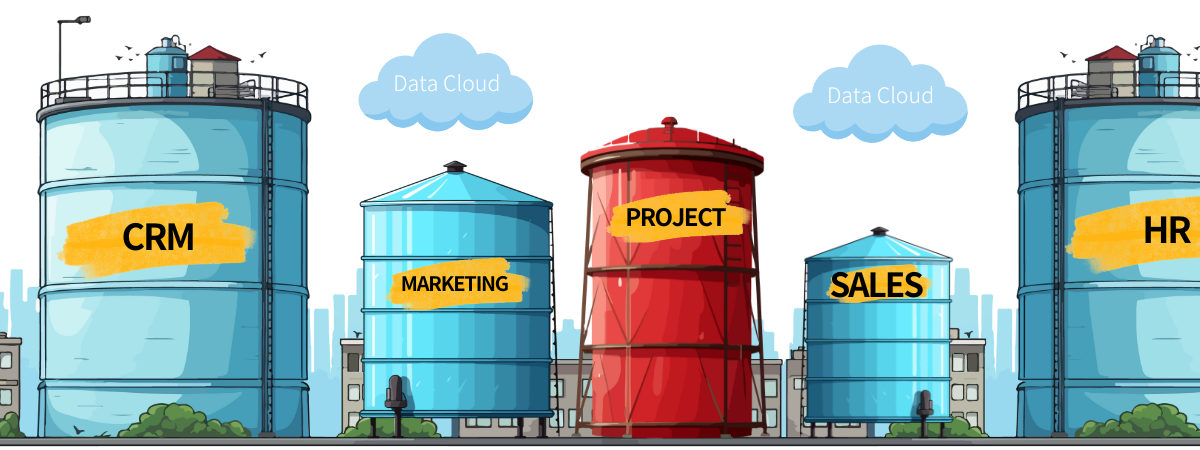Last week, Salesforce wrapped up its highly anticipated Dreamforce 2024 event, unveiling its latest innovation: Agentforce, a suite of Gen AI-powered assistants designed to revolutionize business operations.
While Salesforce's announcement generated significant buzz, it's essential to scrutinize whether Agentforce is genuinely disruptive or merely another incremental advancement in the AI landscape.
Salesforce’s Vision: Data Consolidation for Enhanced AI
During Dreamforce 2024, Salesforce emphasized the critical role of business data in powering effective AI solutions. According to their presentations, the key to unlocking AI’s full potential lies in data consolidation—integrating disparate data sources into a unified platform.
Salesforce introduced Data Cloud as the cornerstone of this strategy, promising seamless integration of multiple software applications and streamlined data management.
The Challenge of Data Consolidation with Data Cloud
While Salesforce's vision for data consolidation sounds promising, implementing it in practice poses significant challenges. Integrating Data Cloud with existing systems requires extensive effort, as businesses typically rely on a myriad of specialized software applications. According to industry reports, only a small percentage of these applications can be seamlessly integrated, leading to fragmented data silos that are difficult to unify.
Data Cloud itself involves complex processes to consolidate data, including data cleaning, transformation, and normalization. Achieving a 100% consolidation rate is highly improbable, given the diversity and volume of data sources companies use. This complexity raises doubts about the feasibility of Salesforce’s approach, especially for organizations that lack the technical expertise and resources to manage such integrations effectively.

The Limitations of Salesforce’s Approach
Salesforce’s strategy hinges on the assumption that businesses can efficiently consolidate their data within Data Cloud to leverage AI-driven insights. However, several factors undermine this premise:
1. Integration Complexity: As highlighted by Mulesoft's 2024 Connectivity Report, only 20% of applications are integrated, making comprehensive data consolidation a daunting task.
2. Scalability Issues: Managing and scaling Data Cloud to accommodate growing data needs can be resource-intensive and may not scale effectively for all organizations.
3. Dependence on Salesforce Ecosystem: Relying heavily on Salesforce’s ecosystem can lead to vendor lock-in, limiting flexibility and increasing costs over time.
These limitations suggest that while Salesforce’s Agentforce offers advanced AI capabilities, its effectiveness is contingent upon flawless data consolidation—something that is challenging to achieve in real-world scenarios.
The Superior Alternative: Low-Code Total Experience Platforms
In contrast to Salesforce’s Data Cloud approach, Low-Code Total Experience Platforms (TX) like CloudOffix offer a more integrated and user-friendly solution for data management and AI implementation. Here’s why:
Seamless Integration from the Start: Unlike Salesforce, which requires extensive data consolidation efforts, low-code platforms are designed to be inherently integrated. This means that businesses can easily connect their existing applications without the need for complex and time-consuming integration processes. CloudOffix, for example, provides a unified environment where data flows seamlessly between different modules, eliminating the need for separate consolidation steps.
Flexibility and Scalability: Low-code platforms offer unparalleled flexibility, allowing businesses to customize and scale their applications as needed. With CloudOffix’s low-code features, organizations can rapidly develop and deploy solutions tailored to their specific requirements, without being constrained by the limitations of a single vendor’s ecosystem.
Enhanced User Experience: The key advantage of low-code Total Experience platforms is their focus on both employee and customer experiences. CloudOffix’s Total Experience (TX) approach ensures that applications are not only functional but also intuitive and user-friendly, fostering higher adoption rates and satisfaction levels.
Why Agentforce May Fall Short
Given the challenges associated with data consolidation through Data Cloud, Agentforce’s success is not guaranteed. The reliance on a complex integration process may hinder its ability to deliver on the promises of seamless AI-driven insights and actions. Without a robust and flexible data management foundation, Agentforce could struggle to provide the consistent and reliable performance that businesses need to drive meaningful results.
The CloudOffix Advantage
In contrast, CloudOffix’s low-code Total Experience platform offers a more practical and efficient pathway to harnessing AI’s potential. By providing a unified, integrated environment from the outset, CloudOffix eliminates the need for cumbersome data consolidation processes. This allows businesses to focus on leveraging AI for actionable insights without being bogged down by integration challenges.
CloudOffix’s unique features empower organizations to customize their workflows and optimize their data flows, ensuring that AI tools can access and analyze data effectively. This holistic approach not only enhances operational efficiency but also maximizes the impact of AI-driven initiatives.
Conclusion
Salesforce’s Agentforce presents an ambitious vision for integrating Gen AI into business operations through data consolidation with Data Cloud. However, the practical challenges of achieving seamless integration and comprehensive data consolidation cast doubt on its disruptive potential. In contrast, low-code Total Experience platforms like CloudOffix offer a more feasible and effective solution by providing an inherently integrated environment that simplifies data management and enhances AI capabilities.
As businesses strive to leverage AI for competitive advantage, the choice of platform becomes crucial. Embracing a low-code Total Experience approach not only mitigates the complexities of data consolidation but also ensures that AI initiatives can thrive, driving sustained growth and innovation.
For more insights, explore our blog on eliminating single-purpose SaaS business applications and learn why transitioning to platform-based solutions with CloudOffix is the key to unlocking AI’s full potential in the modern business landscape.
Latest Blog Posts
We encourage you to follow our blog posts.
